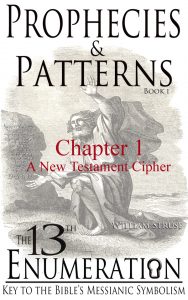 If you are wondering why this blog is The 13th Enumeration – Where History and Bible Meet, today you’ll learn part of the amazing Biblical history behind The 13th Enumeration. Our adventure takes us back nearly 2000 years to a tax collector who penned a Biblical lineage of 41 names, an enigma which has become one of the most disputed texts of the New Testament.
If you are wondering why this blog is The 13th Enumeration – Where History and Bible Meet, today you’ll learn part of the amazing Biblical history behind The 13th Enumeration. Our adventure takes us back nearly 2000 years to a tax collector who penned a Biblical lineage of 41 names, an enigma which has become one of the most disputed texts of the New Testament.
“It is the glory of God to conceal a thing: but the honour of kings is to search out a matter.”
Proverbs 25:2
Even a quick perusal of the biblical record will show you that our Creator, YHWH, doesn’t always do things in a way mankind expects. In fact, when we’re dealing with God, it’s prudent to expect the unexpected. Whether because of our shortsightedness, His sense of humor, or something else, humans have been misunderstanding YHWH’s actions and words since the very beginning.
The examples are almost too numerous to recount: He promised us a Savior. We expected a conquering hero on a white horse; instead He sent us a humble carpenter on a donkey. To meet a giant, He sent a shepherd boy with a stone and a sling. To protect His people from the wrath of Persia, He prepared a young Jewish maiden. To give the city of Nineveh a second chance, He sent a giant fish. We could go on and tell of a young Hebrew man sold into slavery who became the second most powerful ruler in Egypt, or of a harlot who would be the grandmother of a future king. The bottom line is that YHWH often does things that do not make sense based upon our human experience and expectations.
An Unexpected Argument
The first chapter of the first book of the New Testament is no exception. I mean, come on—this is the place you’d expect to find rock-solid, ironclad proof that Yeshua (Jesus) is the Messiah promised in the Hebrew Scriptures. Chapter 1 of the gospel of Matthew is like the opening argument in the most important legal case in the history of the world. Mess up here, and the repercussions will have untold consequences.
The Bible’s opening testimony that Yeshua is the Messiah promised in the Scripture is a most unusual list of His ancestral generations from Abraham to David. The first chapter of the New Testament is a fitting place for such a statement, because it’s important to show that Yeshua fulfilled the Old Testament prophecies that promised the Messiah would come through the lineage of Abraham and David.
But there is a problem. Skeptics and so-called “higher” critics are quick to point out that the list is flawed. Indeed, from our limited human perspective, they are correct. The list is missing several of Yeshua’s ancestors, it’s got a glaring inaccuracy in its math, and frankly, it is written more like a riddle or a code than a straightforward testimony to lineage. Let’s take a look at this enigma, but while we are at it, keep in mind the peculiar way YHWH has of showing His hand in history—of doing the unexpected. With just a little faith—and a little investigation—I think you will see His glory expressed here as well.
So let’s read the opening argument in the Bible’s case for Yeshua (Jesus), the New Testament Messiah.
The book of the generation of Jesus Christ, the son of David, the son of Abraham. Abraham begat Isaac; and Isaac begat Jacob; and Jacob begat Judas and his brethren; and Judas begat Phares and Zara of Thamar; and Phares begat Esrom; and Esrom begat Aram; and Aram begat Aminadab; and Aminadab begat Naasson; and Naasson begat Salmon; and Salmon begat Booz of Rachab; and Booz begat Obed of Ruth; and Obed begat Jesse; and Jesse begat David the king;
. . . and David the king begat Solomon of her that had been the wife of Urias; and Solomon begat Roboam; and Roboam begat Abia; and Abia begat Asa; and Asa begat Josaphat; and Josaphat begat Joram; and Joram begat Ozias; and Ozias begat Joatham; and Joatham begat Achaz; and Achaz begat Ezekias; and Ezekias begat Manasses; and Manasses begat Amon; and Amon begat Josias; and Josias begat Jechonias and his brethren, about the time they were carried away to Babylon:
And after they were brought to Babylon, Jechonias begat Salathiel; and Salathiel begat Zorobabel; and Zorobabel begat Abiud; and Abiud begat Eliakim; and Eliakim begat Azor; and Azor begat Sadoc; and Sadoc begat Achim; and Achim begat Eliud; and Eliud begat Eleazar; and Eleazar begat Matthan; and Matthan begat Jacob; and Jacob begat Joseph the husband of Mary, of whom was born Jesus, who is called Christ.
So all the generations from Abraham to David are fourteen generations; and from David until the carrying away into Babylon are fourteen generations; and from the carrying away into Babylon unto Christ are fourteen generations. (Matthew 1)
Unexpected Omissions
Have you ever heard the saying that sometimes it’s not what is said that matters so much as what is not said? Matthew 1 is a living example of that statement. At first glance the list seems to be a straightforward listing of Yeshua’s lineage from Abraham to David. It’s in verse 17 that the lineage takes an unusual turn. Matthew isn’t just satisfied to give Yeshua’s lineage and leave it at that. He specifically arranges the list in three groups of 14 generations. This makes the list stand out for several reasons:
- First, by dividing the list into three groups of 14, each name in this list becomes identified with a specific column.
- Second, it calls attention to the number 14.
- Third, by arranging the list in this manner, Matthew draws our attention to the missing information in a special way. (Remember all those critics crying foul because the list is “flawed”? They may need to consider that the “flaw” is intentional.)
- Fourth, the three generational groups cause us to consider Yeshua’s lineage in terms of a larger chronological context.
The 13th Enumeration
First, let’s look at the list’s arrangement. For the sake of clarity, I’ve color coded the names above according to their generational grouping. All the names in blue are part of the first group of fourteen generations, names in orange are part of the second, and names in red are part of the third.
Those who took the time to count the generations in Matthew 1:1–16 above have already realized that in fact there are not 14 + 14 +14 generations. Instead, you’ll find there are 14 + 14 + 13. Rather than the expected 42 (3 x 14) names, we find only 41. Our human eyes are likely to see a mistake here. Matthew, we might conclude, can’t even count. How are we supposed to trust anything else he says?
But let’s look at this through the eyes of a shepherd boy who didn’t see an undefeatable giant, but instead an opportunity to show the glory of the living God. Instead of assuming an error, let’s assume purpose.
In the chart below, I’ve arranged the list to give us another way to look at the information.
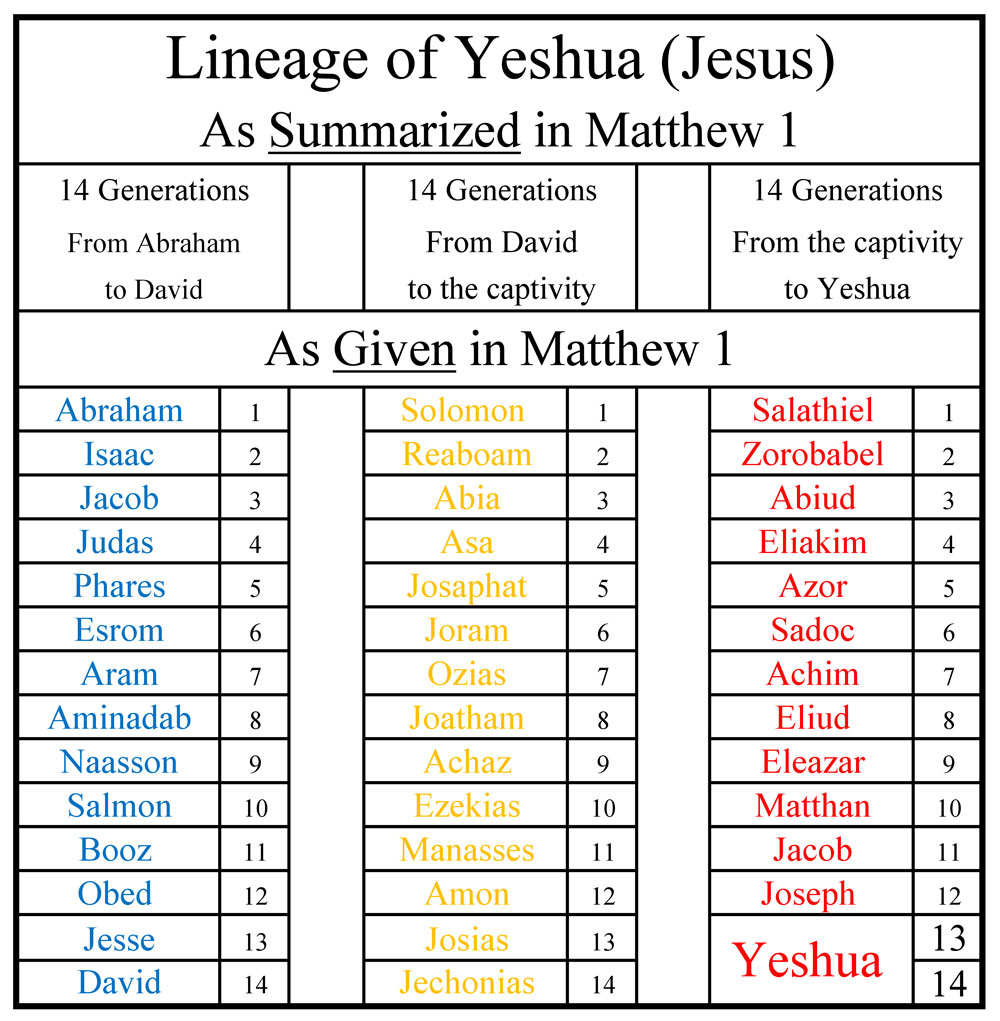 If you have trouble reading these charts you will find high resolution images at the following link: The 13th Enumeration Images
If you have trouble reading these charts you will find high resolution images at the following link: The 13th Enumeration Images
It’s pretty clear from this list that Matthew intended for Yeshua to be listed as the 13th—what I call “the 13th Enumeration.” But why? Why, in a list that supposedly shows 14 generations for all three columns, does it instead show 14 generations in only two?
I believe the verses below might just give us a hint.
But I would not have you to be ignorant, brethren, concerning them which are asleep, that ye sorrow not, even as others which have no hope. For if we believe that Jesus died and rose again, even so them also which sleep in Jesus will God bring with him. (1 Thessalonians 4:13–14, emphasis mine)
But now is Christ risen from the dead, and become the firstfruits of them that slept. For since by man came death, by man came also the resurrection of the dead. For as in Adam all die, even so in Christ shall all be made alive. But every man in his own order: Christ the firstfruits; afterward they that are Christ’s at his coming. (1 Corinthians 15:20–23, emphasis mine)
And so it is written, The first man Adam was made a living soul; the last Adam was made a quickening spirit. (1 Corinthians 15:45, emphasis mine)
You see, Yeshua—the 13th generation of Matthew 1—died and then rose again from the grave, and in so doing He became the 14th generation as well. His death paid the righteous price for our sins, and upon His resurrection He completed Matthew’s list. Yeshua is both the 13th and the 14th generation in Matthew 1. The “flaw,” it turns out, is a riddle—one that points to the greatest proof of Yeshua’s Messiahship.
In a much larger context, this list is a key to guide our future Messianic expectations. The Messiah Yeshua is to have a dual role in our Creator’s plan for mankind. He came the first time as a suffering servant (the 13th generation of Matthew 1), but someday He will rule from the throne of David as a conquering king (the implied 14th generation of Matthew 1).
For unto us a child is born, unto us a son is given [Yeshua, the 13th generation]: and the government shall be upon his shoulder: and his name shall be called Wonderful, Counsellor, The mighty God, The everlasting Father, The Prince of Peace. Of the increase of his government and peace there shall be no end, upon the throne of David [Yeshua the Messiah, the 14th generation, the reigning king], and upon his kingdom, to order it, and to establish it with judgment and with justice from henceforth even for ever. The zeal of YHWH of hosts will perform this. (Isaiah 9:6–7)
The Number of a King and of a Sacrifice
The second unique feature of Matthew 1 is that the list draws our attention to the number 14. Fourteen has special significance in the Bible as it relates to the sacrificial system.
- On the 14th of the month Nisan, the Passover lamb is sacrificed. John the Baptist described Yeshua as “the lamb of God which taketh away the sins of the world.”
- Fourteen lambs are killed for each of the first seven days of the burnt offering sacrifices during the Feast of Tabernacles.
- According to Numbers 28, the first day of the Feast of Unleavened Bread requires 14 sacrifices to be consumed. (More on this in chapter 10.)
Worth considering are the words of the apostle Paul concerning Jesus and David:
. . . concerning his Son Jesus Christ our Lord, which was made of the seed of David according to the flesh [13]; and declared to be the Son of God with power, according to the spirit of holiness, by the resurrection from the dead [14]. (Romans 1:3–4)
Did you know that in ancient Hebrew, letters were used to represent numbers? It is fascinating to learn, then, that the Hebrew name David has a numerical value of 14. Further solidifying this symbolism is that David is listed as the 14th generation in Matthew 1:
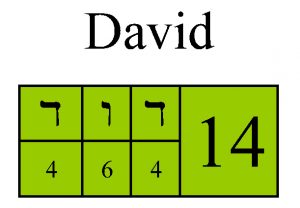 As you can see, the symbolism is stunning! Just as King David is represented as the 14th generation in the first column of Matthew 1, Yeshua the risen Messiah becomes the 14th generation in the third column. How beautiful, then, to acknowledge the words of Luke:
As you can see, the symbolism is stunning! Just as King David is represented as the 14th generation in the first column of Matthew 1, Yeshua the risen Messiah becomes the 14th generation in the third column. How beautiful, then, to acknowledge the words of Luke:
And, behold, thou shalt conceive in thy womb, and bring forth a son, and shalt call his name JESUS [Yeshua]. He shall be great, and shall be called the Son of the Highest: and the Lord God shall give unto him the throne of his father David. (Luke 1:31–32, emphasis mine)
Four Missing Kings
Now, let’s look at what was left out of Matthew 1. Today the Bible scholars who believe Matthew 1 to be an intentional representation of Yeshua’s lineage, and not just a mistake, excuse the four missing kings by explaining that they were particularly evil. The biggest problem with this theory is that many of the kings left in the list were just as evil—or more so—than the ones left out. Manasses, infamous for child sacrifice, is here. So is Achaz, who shows up numerous times in the books of Kings and Chronicles and of the prophet Isaiah as a stubborn, rebellious idol worshiper and temple desecrator who constantly thumbed his nose at God. Even David, we must acknowledge, was both an adulterer and a murderer. Further, the one king who has the dubious distinction of being cursed directly by YHWH through all his generations—Jechonias—is left in the lineage. If we are to believe that Matthew 1 was intentionally arranged the way it is, then the missing kings were left out for another reason.
Let’s take another look at Matthew 1 and see if we can find the reason in the unreasonable.
If you have trouble reading these charts you will find high resolution images at the following link: The 13th Enumeration Images
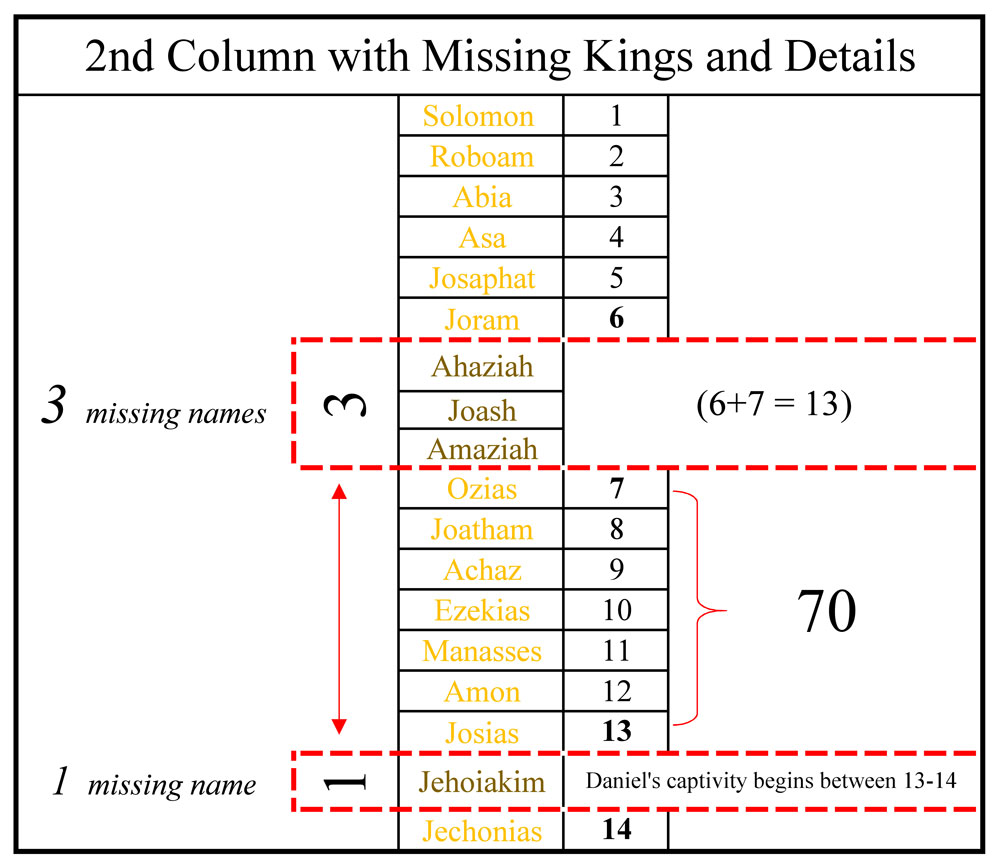 The red dotted lines in the three-columned image above mark where the missing kings should be. Below those three columns, I’ve broken out the second column with the missing kings added where they fall chronologically. It becomes apparent that just as Matthew chose to represent Yeshua as the 13th generation and by implication as the 14th in His resurrection, he also chose to exclude the four missing kings for equally symbolic reasons.
The red dotted lines in the three-columned image above mark where the missing kings should be. Below those three columns, I’ve broken out the second column with the missing kings added where they fall chronologically. It becomes apparent that just as Matthew chose to represent Yeshua as the 13th generation and by implication as the 14th in His resurrection, he also chose to exclude the four missing kings for equally symbolic reasons.
First, let’s look at King Jehoiakim, who is missing between the 13th and 14th generations. Jehoiakim’s name means “YHWH raises up.” Indeed, Yeshua—the 13th generation whom “YHWH raises up”—became the 14th generation as well.
The other three kings left out of Yeshua’s lineage are missing between the 6th and 7th generations—and of course, 6 + 7 equals 13. As we will see in subsequent chapters, there is a distinctive symbolism in the Scripture relating to the numbers 6, 7, and 13.
It’s also worth noting that the four missing kings are in groups of 1 and 3.
Looking at the lineage of Yeshua in this way, it becomes evident that there was a bigger purpose to Matthew’s arrangement of this list than just showing Yeshua was both the 13th and 14th generation. The question before us is why? Why did Matthew take such liberties with Yeshua’s lineage? What purpose could justify such a peculiar arrangement of names and numbers?
If that question intrigues you, as it does me, then I ask: won’t you join me as we continue to explore this wonderful subject? Together, let’s discover the purpose behind the 13th Enumeration.
“Search the scriptures; for in them ye think ye have eternal life: and they are they which testify of me.”— John 5:39
* * *

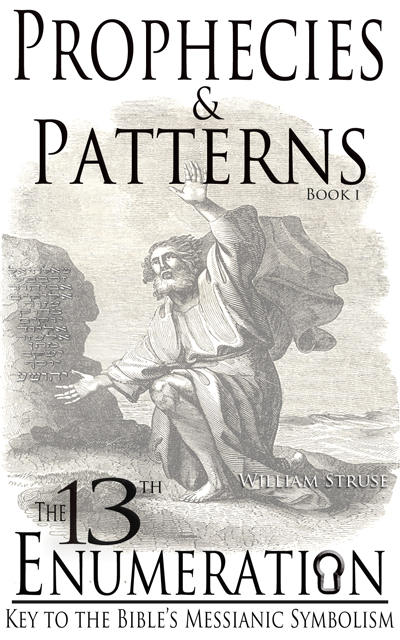
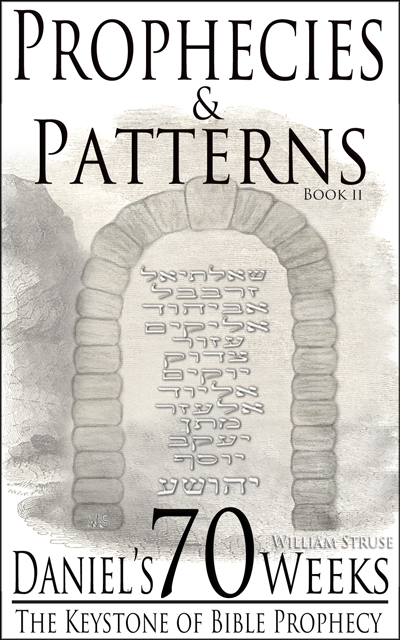
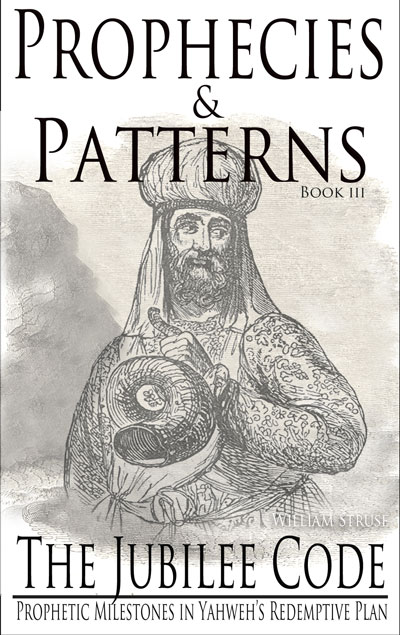
Dear sir,
It’s nice for this subject to be re-visited after the book has been read and had left me completely baffled. You know, why on earth would Matthew play the numbers game on us? I mean like Christ has died, Christ has risen and Christ will come again. I just believe it, you know, like I don’t need more proof of He being the Messiah. I know He is.
Good morning Christopher,
Thank you for your comments. The book of Matthew was written to a Jewish audience with metaphor and symbolism that they would understand. To those immersed in the Torah and a Biblical calendar the list of Matthew would make intuitive sense. To you and me it appears more like a numbers game or a cipher but in a Jewish context to a Jewish audience it would have a more compelling meaning. At the end of the day it all takes faith, numbers and symbolism or not.
Warm regards,
William
In some ways, like Christopher, the numbers are not necessary for my faith. However, I know the Bible has many things that are revealed progressively.
I read your books because I enjoy them. I am looking forward to the next one!
Susan
I have devoured both this book and Daniel’s 70 Weeks, and am now into the third book on the Jubilee Cycles. There is no doubt in my mind that God led me to your website after much prayer— asking for wisdom and understanding of Daniel’s 70th week. I can’t thank you enough for putting all of your hard-earned knowledge into these three books, and then giving them away for free; this is so rare today! Yesterday I emailed you a link that I hope can answer your question on Paul’s statement of “…and so all Israel will be saved.”
Hello William,
I just stumbled on you website and it contains a lot of information about the Bible that I am particularly interested in as a Believer in Jesus Christ, Lord God and Savior.
I am just beginning to go through your studies and I am requesting that you might also do the same for mine as I believe you will find a lot of harmony, but I will let you be the judge of that.
Please see: https://bereansearching.com and take a look at the studies, beginning with any of the studies that pique your interest. I might suggest Esther, Jonah, Judges 4&5, and Ruth but the hermeneutics are provided here: https://bereansearching.com/2021/12/12/exalting-the-person-and-work-of-jesus-christ-the-key-to-unveiling-the-mystery-of-the-bible-a-typological-interpretive-guide-to-biblical-understanding/
Please take a look and let me know what you think. Also feel free to comment on the site itself.
Thank you so very much.
Sincerely,
Vincent
Hi Vincent,
Thank you for the links. I will take a look.
Warm regards,
William
Good Morning Sir,
I received your email this morning (Sunday, May 28, 2023) and this was in your email:
Sorry for the inconvenience but I left an old template link in my last email update. I’ve corrected the problem and now the link is good.
Also I just wanted to say thank you for those of you who have taken the time to write a book review of The Lazarus Ciphers. It is encouraging to me to know you appreciated the story.
Warm regards,
William
P.S. The link now just directs you to my blog.
I tried to open the link and this is what I am getting:
This site can’t be reached
http’s DNS address could not be found. Diagnosing the problem.
DNS_PROBE_POSSIBLE
I have even tried opening the link in two different web browsers and I still receive the same message.
Is this on your website? If so, I have not been able to locate it yet.
Thank you for your consideration to this inquiry and have a great day,
Eddie Rogers, Minister, D.D.
https://truenews4u.com